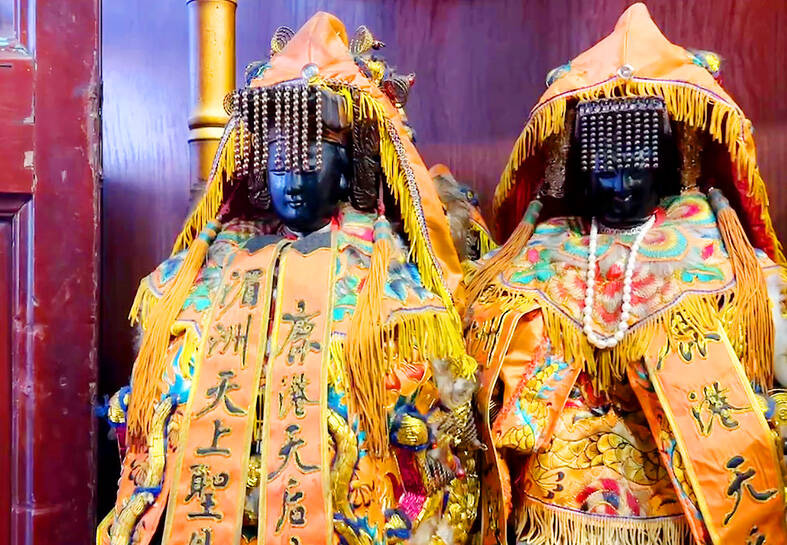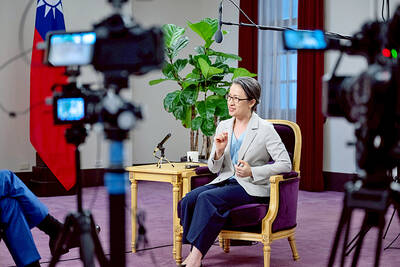Police in Changhua County earlier this month arrested a man in New Taipei City for allegedly selling statues borrowed from Matsu (媽祖) temples.
Lukang Township (鹿港) police said they on Nov. 12 arrested a 34-year-old man surnamed Hsu (許) in New Taipei City’s Sanchong District (三重) for allegedly selling a statue borrowed from Lukang Tianhou Temple.
Police were alerted after a buyer became suspicious of the statue purchased for NT$10,000 on a Web site for auctioning secondhand deity statues and other religious items.

Photo courtesy of a reader
The buyer told police that when he met Hsu, he said the statue was abandoned and not from a temple currently in operation.
However, the buyer said he was suspicious because the figure appeared to be recently used with a buildup of incense smoke on it.
After finding the name of Lukang Tianhou Temple imprinted on the statue’s outer robe, he said he called the temple, where temple officials confirmed that the statue belonged to them, adding that it is known as a “guest” Matsu statue, which can be “borrowed” for festivals or to celebrate a family event, then returned after the “residency period” is over, which is usually three days.
The buyer returned the statue to the temple and reported the incident to the Lukang Police Precinct on Nov. 10.
Police said that Hsu admitted borrowing the statue from the temple on Nov. 3 and listing it for sale online.
Hsu told police that he also borrowed a Sufuwangye (蘇府王爺) statue from Lukang Fengtian Temple and sold it online for NT$10,000.
Hsu faces fraud and embezzlement charges, police official Chang Sheng-sheng (張勝甥) said, adding that investigators are seeking to determine whether Hsu had any accomplices.
Lukang Tianhou Temple secretary-general Liu Chia-wen (劉家汶) said that worshipers can apply to borrow “guest” Matsu statues for free for private events.
“This is the first time we had a person apply for a statue using another person’s identity, and then sell it in an online auction,” Liu said.
The temple would now require two forms of identification from anyone applying to borrow one of the statues, he said.
The incident has attracted interest from the public to borrow “guest” Matsu statues, which are not the main Matsu statue of a temple, but usually among the secondary deities worshiped.
He said that people or local temples or shrines cannot apply to take out a specific statue, as the statue they would receive is chosen through a divination process.
“People usually go to their town’s major temple to ‘invite’ a god or goddess statue when having celebrations, such as a wedding, settling into a new home or opening a new store. It is an important tradition, and still observed by people in Lukang,” Liu said.

China might accelerate its strategic actions toward Taiwan, the South China Sea and across the first island chain, after the US officially entered a military conflict with Iran, as Beijing would perceive Washington as incapable of fighting a two-front war, a military expert said yesterday. The US’ ongoing conflict with Iran is not merely an act of retaliation or a “delaying tactic,” but a strategic military campaign aimed at dismantling Tehran’s nuclear capabilities and reshaping the regional order in the Middle East, said National Defense University distinguished adjunct lecturer Holmes Liao (廖宏祥), former McDonnell Douglas Aerospace representative in Taiwan. If

TO BE APPEALED: The environment ministry said coal reduction goals had to be reached within two months, which was against the principle of legitimate expectation The Taipei High Administrative Court on Thursday ruled in favor of the Taichung Environmental Protection Bureau in its administrative litigation against the Ministry of Environment for the rescission of a NT$18 million fine (US$609,570) imposed by the bureau on the Taichung Power Plant in 2019 for alleged excess coal power generation. The bureau in November 2019 revised what it said was a “slip of the pen” in the text of the operating permit granted to the plant — which is run by Taiwan Power Co (Taipower) — in October 2017. The permit originally read: “reduce coal use by 40 percent from Jan.

‘SPEY’ REACTION: Beijing said its Eastern Theater Command ‘organized troops to monitor and guard the entire process’ of a Taiwan Strait transit China sent 74 warplanes toward Taiwan between late Thursday and early yesterday, 61 of which crossed the median line in the Taiwan Strait. It was not clear why so many planes were scrambled, said the Ministry of National Defense, which tabulated the flights. The aircraft were sent in two separate tranches, the ministry said. The Ministry of Foreign Affairs on Thursday “confirmed and welcomed” a transit by the British Royal Navy’s HMS Spey, a River-class offshore patrol vessel, through the Taiwan Strait a day earlier. The ship’s transit “once again [reaffirmed the Strait’s] status as international waters,” the foreign ministry said. “Such transits by

Taiwan is doing everything it can to prevent a military conflict with China, including building up asymmetric defense capabilities and fortifying public resilience, Vice President Hsiao Bi-khim (蕭美琴) said in a recent interview. “Everything we are doing is to prevent a conflict from happening, whether it is 2027 or before that or beyond that,” Hsiao told American podcaster Shawn Ryan of the Shawn Ryan Show. She was referring to a timeline cited by several US military and intelligence officials, who said Chinese President Xi Jinping (習近平) had instructed the Chinese People’s Liberation Army to be ready to take military action against Taiwan